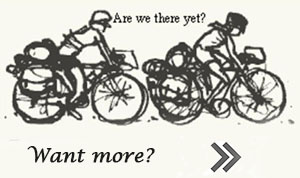Day 7 - Barra / Ferry Eriskay / Sth Uist, Kildonan / Homore
Page 8
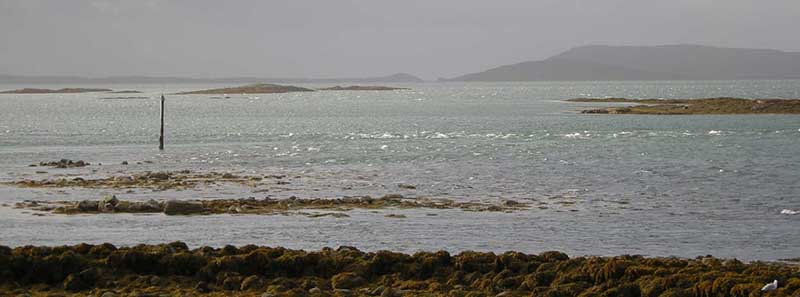
5-Star Toilets
The next morning was nearly another grey one, the weather appeared not to have made its mind up as to what it was going to do today. There was just a hint of blue sky, so hopefully another dry day. We had a ferry to catch at 9.30 and about 5 miles to do before catching it. Me, being in total paranoia about ferry timings and getting there early, meant that our arrival at the terminal was just that, ridiculously early.
We did not pass one vehicle on our journey to the 'harbour' (concrete ramp, actually). Unlike the 'bus shelters' we had previously experienced, this one was a 5-star terminal, a modern wooden building with a grass turf-covered roof and modern wooden sculptures in the rockery garden. There was even a café, but we were too early for that to be open, I did, however, try the door, and much to my surprise, it was unlocked, although the building was deserted. It appears that it remains unlocked throughout the year, so access was gained to the toilets and all the hot water we needed to wash with. The café-bar bit was behind shutters, but in general, we had a centrally heated waiting room. Slowly, vans and cars began to appear, as well as the café operator who was kept busy supplying bacon rolls and the like to the twenty or so people for the usual Barra 'rush hour'.
This time, the ferry didn’t make its appearance from a long way off, it suddenly and silently appeared from around a headland, and we were soon on our way to the island of Eriskay. Disembarking there and preparing to head off, Chris discovered that he had left his cycle gloves in the toilets. Well, I say his gloves; they were, in fact, mine, as I had lent them to him. We did briefly consider jumping back on the ferry for the return trip to pick them up, but it would be midday before we were back at the same spot we were now, so reluctantly, that option was abandoned.
There was quite a steep climb out of the ramp, but the sun did shine on us as we rolled onto Eriskay. That’s the name of the village as well as the island, it’s too small to have separate names. We were immediately reminded that while the good thing about ferries is that it’s downhill to get to them, the bad thing about ferry terminals is it’s uphill to leave.
To the left of us was the famous beach where Bonnie Prince Charlie first landed on Scottish soil and started the Jacobite rebellion which held back the advancement of Scotland for the next 200 years.
My 'Charlie' Rant
The Jacobite ‘45 rebellion after the passage of time needs some realigning and the truth to be told about this so-called hero of Scotland. Bonnie Prince Charlie, the Young Pretender, Charles Edward Louis Philip Casmir Stuart – this doomed hero of the Scottish resistance was a gormless, ignorant, in-bred, aristocratic waster. Brought up in Italy, he spoke not a word of English, never mind Scots. He managed somehow, to persuade France to invade Scotland. The French didn’t take him too seriously and sent all of two ships to do the job. Enroute, the French ships were chased back, leaving our shortbread-tin hero on the shores of Eriskay. The locals advised him to go home."This is my home". He replied, in an Italian accent. The rest, as they say, is history.
He did wander around central Scotland for a while and had a minor win at the Battle of Prestonpans. Full of self-assurance he now thought ‘why settle just for the King of Scotland’ and went for the big one – the throne of England. And duly took his army south. He did get very near to Derby, but the army ran out of steam. The Scots, seeing what England was really like, decided it ‘wasna' worth the bother’ and went back home.
Charlie-boy now had a price on his head and was on the run. After posing in full tartan regalia for yet another shortbread biscuit tin, he ended up on the moor at Culloden, where, contrary to popular belief, it was the Scots who thrashed the Scots (you could put up a reasonable argument that the Scots won the battle of Culloden). This time 'The Butcher', the Duke of Cumberland, oversaw the end of Scottish culture, and its effect was to last for 200 years. Meanwhile, with a £30,000 bounty on his head, Charlie hid at various places in the Highlands and Islands. Not one Scot in the five months he was on the run betrayed him.
This is where Flora McDonald comes into the picture, she was the real hero in all this. Risking her life and her family’s - what did she get in return for saving his skin, a bottle of whisky and a chicken! Whoopee! Charlie boy, meanwhile, wasted away back in Italy; an embittered has-been, dying a lingering death in 1788.
There you go: incompetent, inconsiderate and shameless. In the end, he was no more than the King of Shortbread, the Prince of the Whisky bottle label and his legacy was the butchery of thousands of Scots and then the forced misery of emigration for a million people.
Losing the Grey
Back at Charlie boy’s beach, the sand as white as anything you would see on a South Pacific Island. The sun was shining, bringing out a very bright turquoise colour to the water. The islanders themselves don’t do a lot of colour; houses come in one colour, white! The occasional rusty, red corrugated shed roof broke up the monotony. Most lived-in houses are modern, prefab, pebble dashed concrete making best use of insulation and wind-proofing. The rest are empty and in various stages of beautiful decay, abandoned to the mercy of the ever-present wind.
I insisted on a quick detour to a sheltered sea loch on the east side, which I had visited twice on yachting holidays many years ago. I was surprised by the amount of work going on and a new road was being built to it. EU budgets were having another hit. My feeling was that it wasn’t for the better. The scar across the landscape to give greater access for the fish farm lorries was, I fear, short-lasting. The scandalous pollution of the waters by these intensive, secretive, highly polluting fish farms added to my dismay about what was happening in the area. We called in at the local Co-op Supermarket, where we bought the usual collection of postcards and discounted foods for an intended picnic later.
The Whisky Galore.
The next stop was the pub 'The AM Politician'. There we had a pleasant time with the bar operative, a young girl from the island who was due to leave soon for university. I mentioned being here many years ago, and she produced from under the bar a log of visiting yachties, and there I was - being there in 1994. It brought back a lot of good memories. I was telling Chris about the story of the Ealing film, Whisky Galore, which was enhanced further by the bar-person producing two bottles of the very same, recovered from the wreck, as well as an assortment of ship debris. The old whisky bottles contained what looked like ancient pee.Eriskay’s only pub, the AM Politician, trades shamelessly on the event that happened in 1941. The SS Cabinet Minister (changed its name to Politician, for the film) was a Second World War cargo boat that was wrecked while waiting for a convoy to gather and heading to the USA. The hard truth behind it all is long lost to romantic nonsense. The truth is that there is an over-authoritative campaign by Custom and Excise to prosecute the islanders. The islanders and the local Police in their minds had done no wrong, the whisky was not going to be officially salvaged. At least twenty adult men were imprisoned in Inverness for stealing the whisky. This was at a time of great depression on the islands, causing near starvation for their families. But the story was not quite over. In 1987, a local South Uist man found eight bottles of whisky in the wreck. He sold them at auction and walked off with £4,000. It seems that the people of Eriskay can still turn a tidy profit from the sea.
South Uist Awaits
The way to the next island was across a very long exposed causeway. Luckily, it was dry and not particularly windy; otherwise, it would have been a major obstacle. After the obligatory photographs were taken, we were now on the island of South Uist. This island seems to get right under your skin. The landscape ranges from the most stunning coastal scenery with white unspoiled beaches and crystal-clear water, to empty moorland nothingness. It’s just beautiful, their central strand is as flat as the Fens, but without pubs and villages.
As we pedalled north, the setting sun compressed between the clear west and a heavy black line of clouds in the east. I didn’t see one stand of cereal crops: no wheat, no barley, just small fields thick with buttercups, red clover and flower heads the size of golf balls. The southern islands of the Outer Hebrides are connected by one main road, the A859. Feeding off this are narrow single-track lanes with passing places. The main road weaves between pools the colour of a peaty whisky and acres of white-water lilies.
The west sides are almost unpopulated, just expanses of bogs and rocks where the sea lochs reach deep into the body of the land. It’s a good flat road leading north, though the only trees I saw there were of the stumpy weather-beaten sort. With barely a car in sight, our road swooped along the spine of South Uist. To one side rose a clutch of fearsome-looking mountains, to the other, rolled dunes, sequinned with flowers. What makes a village here is that the houses become a little bit closer together, usually around a church or a primary school. Even the occasional road signs do not give any clue as to where you are, all road signs in these islands are firstly, in Gaelic, and without exception totally unpronounceable.
On a hill at one such place was a building so huge and ugly I had to stop and make a comment. It was a concrete monstrosity of a thing, totally and absolutely out of keeping with the area. How does such a building get erected? It had very few windows and rough concrete as cladding. What’s wrong with natural materials that have stood the test of time? The passer-by sees nothing but brutality and a dominant presence in the community of such a carbuncle. . . .it’s a Catholic Church . . .need I say more?
McDonald’s for Lunch
Actual tourist spots are few and far between. When there is one, for example, Flora McDonald’s birthplace, the brown tourist signs start a count-down from at least 20 miles away. The build-up to it becomes positively hysterical the closer you get. Even if you didn’t know who Flora MacDonald was or even cared, the wrath of the tourist board would be on you if you even considered not stopping. As it was, our arrival there coincided with lunch. It took all of two minutes to stare at the fallen masonry, a few boulders were all that was left of her family home. The usual laminated notice board described the site and recited the now famous story.
It was interesting to note that in a few days' time we will be on Skye and passing Flora’s grave.
We were to get there by a more direct route; she went via America.
Despite the lack of anything tangible to see and no visitors centre, café, souvenir shop, entrance fee, pay and display car park, burger vans, ice cream vans, the place had a certain atmosphere.
That didn’t stop us from setting-up a picnic, (herrings and cheese, if you must know).
Just like being at home, what should happen?
Visitors, certainly American or maybe Canadian, but on the plus side, there were only just two of them.
They passed us without comment staring, for all of two minutes at the pile of rocks, just as we had done.
On the way back to the car, they stopped, and we had that embarrassing moment where one of us should speak.
It was me that broke the silence with my best joke of the whole trip. I said....wait for it....
"We are having lunch at MacDonald’s".
Well, its wit, intelligence, sense of irony, it all combined to make the perfect joke for the occasion.
Even Chris had a 'little titter' and then had a laugh as well.
The effect on our two friends from across the pond was stunned silence.
I could see they thought I was taking the piss.
The way they scurried off back to the car, the tyres flying gravel up into the air, suggested they wanted to put as much distance from us as possible.
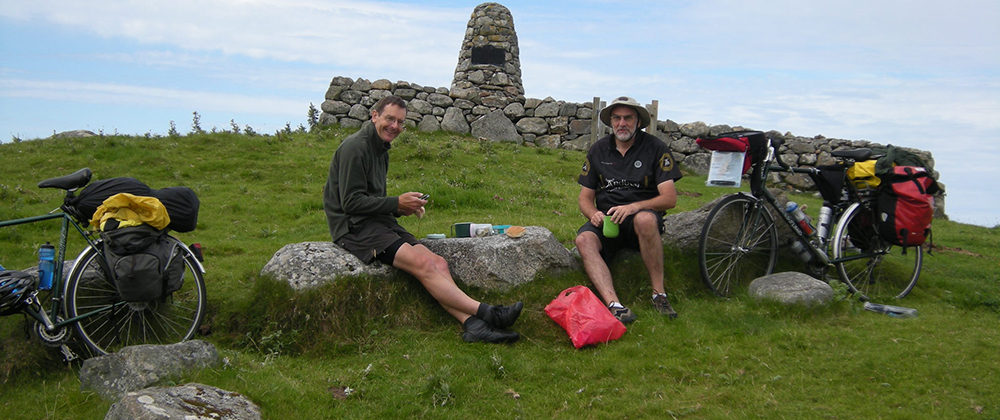
Homore Hospitality
After lunch, it was back on pedal power, the road was very straight, not particularly wide (for an A road) but it was relatively quiet, and we had a good ride to Homore Hostel. What a great place it turned out to be. It's one of four places on the islands run independently of the Hostel Association, although advertised by them. It makes use of old buildings, and all are well over a hundred years old. The general standard is at the lower end of the scale of about minus one star, but in atmosphere, definitely 5-star. I chose to sleep in the tent. Chris was in the bunkhouse as it was fractionally less draughty than his own tent.
As we settled down for the night in the communal area, our co-guests turned out to be two girls from Glasgow doing the whole trip on public transport, a young French couple, then there was a young German girl on a bike. She had some great stories about her travels cycling all over Europe, she was an English teacher (or even a teacher of English), plenty of time then, to do this sort of thing. We all had a great laugh as we attempted to play Scrabble in four languages (yes four – French, German, English and Glaswegian).
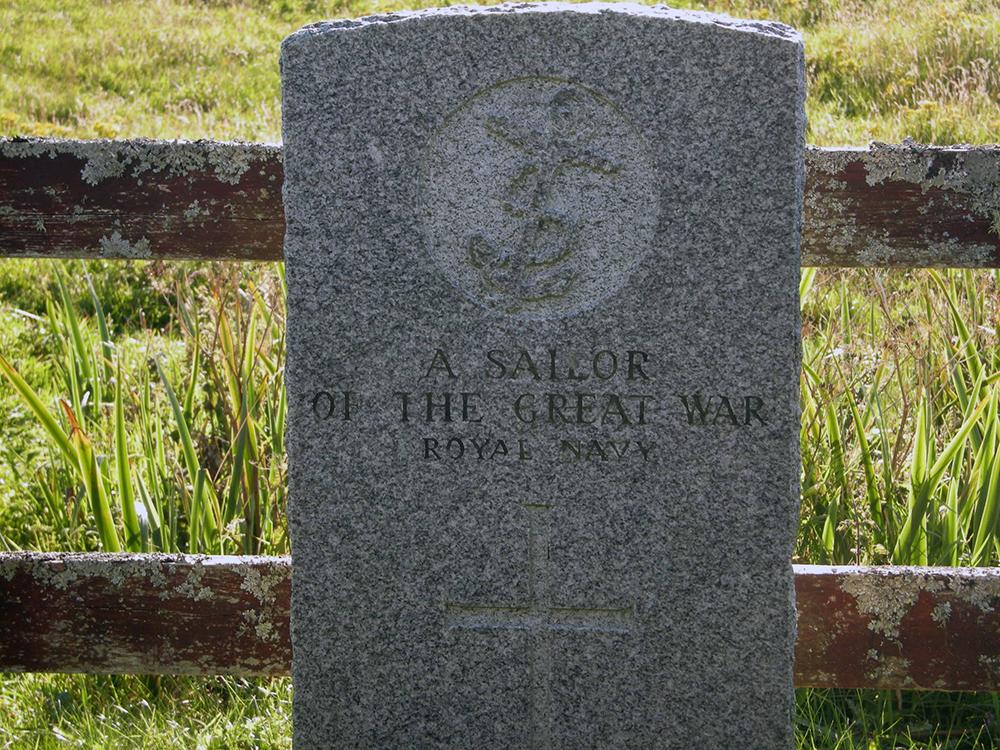
There was clearly a wind of change in the air. These winds have free rein over the vastness of these islands, and they seemed to be starting to exercise that right. The good old shipping forecast confirmed our worst fears, by tomorrow night, storm force nine. Yes, NINE! We had 60 miles to do tomorrow. Believe me, you do not want to be cycling in the Outer Hebrides in a force nine gale. We had an executive meeting and decided to spend the next day here at Homore.
This would, of course, put us a day behind schedule. Our initial intention was to get the ferry from Tarbert to Mallaig but we also had the choice of getting a crossing to Oban from Lochboisdale and cutting short our tour of the Outer Hebrides. The weather has once again been the dominant factor of this trip.
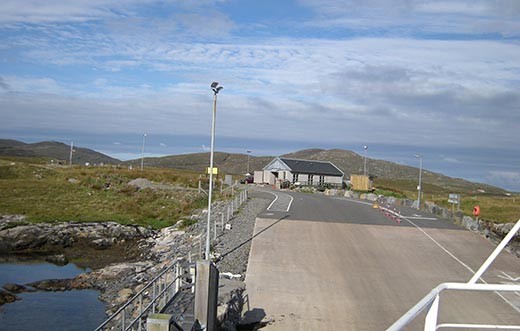
Toilet, cafe what more do we need?
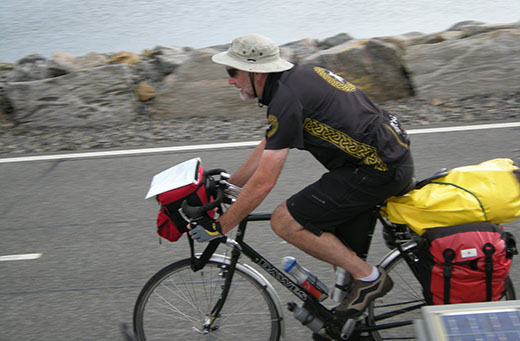
Crossing the causeway between Barra and Eriskay
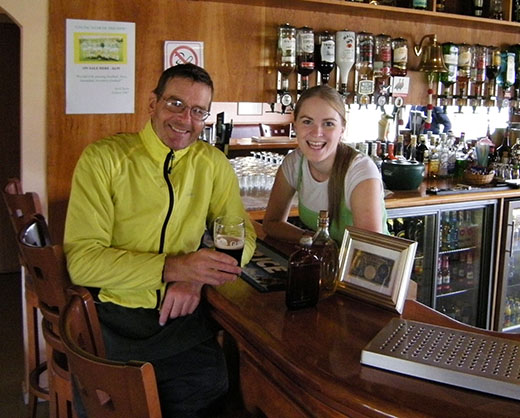
Bar operative with two old relics (bottle on the bar is from SS Politician)
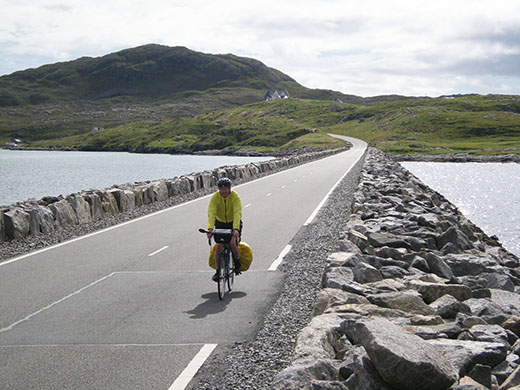
Watch out for otters!

Did this get planning permission?
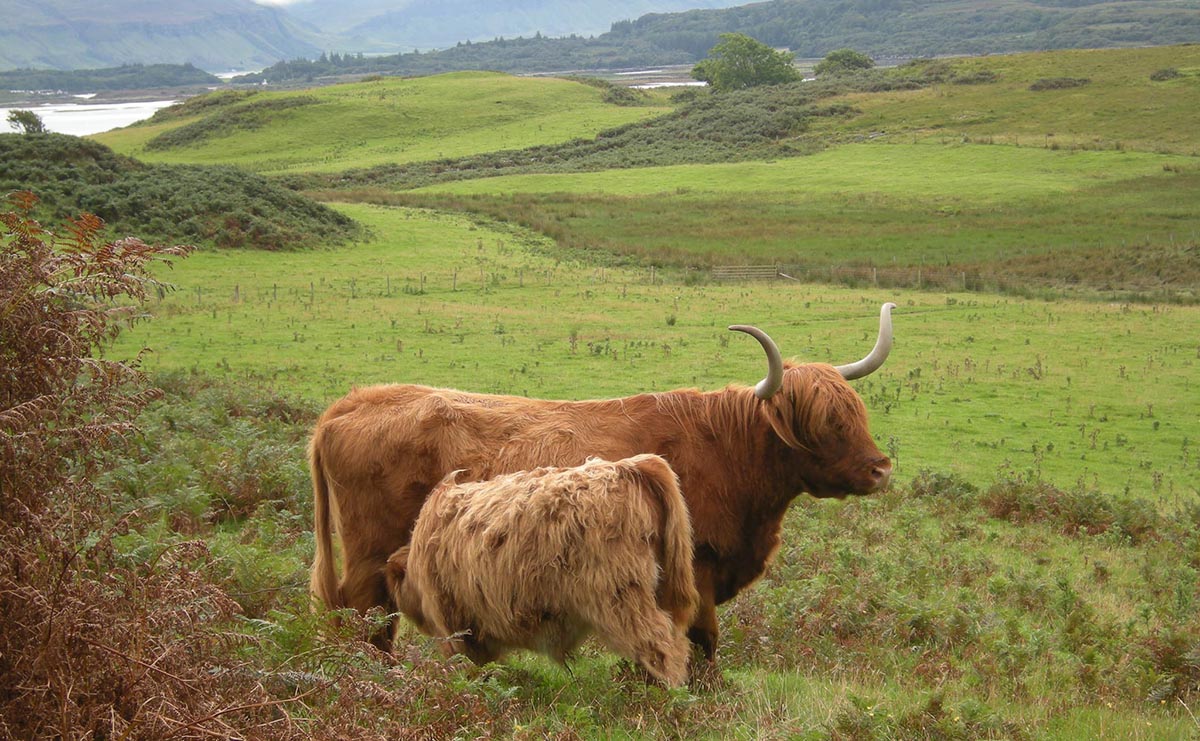
Coo wi' a view
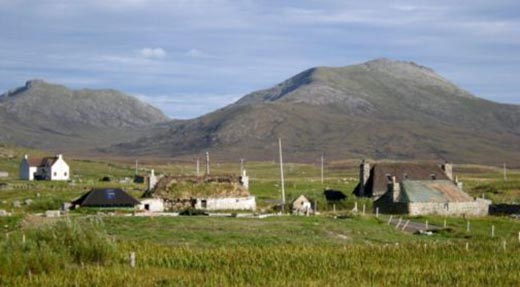
Homore hostel
Scene from the Ealing Comedy-Whisky Galore! 1949.
Its the Sabbath and the Captain is trying to gather together the islands Home Guard.
Captain Paul Waggett: I want to speak to your son George.
Mrs Campbell: George is in his bedroom.
Captain Paul Waggett: Oh, not ill, I hope.
Mrs Campbell: He’s locked in his bedroom with his Bible and some bread and cheese, and he’ll not be out until tomorra’ mornin’.
Captain Paul Waggett: I never heard of anything so preposterous!
Mrs Campbell: Did you ever hear of the Fourth Commandment?
Captain Paul Waggett: Of course, I have!
Mrs Campbell: Remember the...
Captain Paul Waggett: You needn’t repeat it. I learned the Commandment years ago.
Mrs Campbell: More shame to you then that yeh should lead my son away from righteousness.
Captain Paul Waggett: Mrs. Campbell, at this very moment our troops are fighting in North Africa. The Germans don’t stop fighting on Sunday, so how can we?
Mrs Campbell: What the Germans do, Mr. Waggett, is on their own conscience, and Toddy is not in North Africa, so there’s no need to bring the heathens into it. I’ve been told that there are cannibals in Africa, but no one is going to persuade my son to eat human flesh.
Captain Paul Waggett: No one’s asking your son to eat human flesh!
Mrs Campbell: Not yet!
Captain Paul Waggett: I insist on speaking to George himself!
Mrs Campbell: You could go down on your bended knees, and I’ll not let you speak to George!
Captain Paul Waggett: I certainly shall not do that!
Mrs Campbell: [Contemptuously] Hah!
[Turns and closes the door]
Barra and the Highland Clearances
Research into Colonel Roderick MacNeil, last chief of Clan MacNeil, has revealed the desperate moves of the man who felt 'no sense of compassion or responsibility' to his tenants. Who evicted his tenants and embarked on what is believed to be Scotland's only case of forced labour.
He inherited vast debts from his father, with the chief choosing a 'much more commercial - and tyrannical - policy' towards his estate and tenants who lived on Barra and the neighbouring Bishop's Isles of Mingulay, Sanday, Pabbay and Berneray.
He evicted crofters from fertile land, such as on the west coast of Barra, to make way for sheep grazing and settled the tenants on the east coast, where the land was far more barren.
Up to 500 people, some involved in the supply of kelp to the factory, were employed at the factory with an unknown number of workers likely living in the plant's 'barracks room'.
The boundary wall to the factory still stands, with the outline of doorways still seen where boats would deliver the kelp for processing.
Indeed, MacNeil instructed all his crofting tenants in Barra to supply the factory with kelp - even forbidding them from using seaweed as fertiliser on their crofts - and set many of them to work at the factory.
Although the crofters of all five southern islands were evicted, for some of the year 1835 at least, the people of Berneray bore the brunt of MacNeil's tyranny
Those forcibly evicted and forced off the island had this response from the Colonel:
"Say to those who are about to emigrate that I sincerely wish them well through it, and assure those who have signed and repented that their repentance comes too late. So help me God, they shall go at all events off my property, man woman and child."
